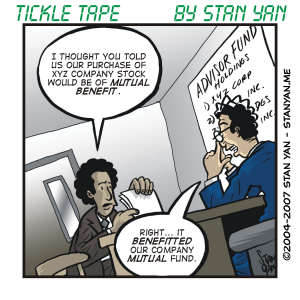Can an ant move a rubber tree plant? Perhaps it can if it has “high hopes.” This image exemplifies the eternal optimist. The power of positive thinking, if only we could muster enough of it, we could move mountains. You must have high hopes to trade successfully. Many people attempt to master the markets, but few achieve enduring success. If you don’t push yourself, you’ll never make it. But optimism has its time and place. There’s optimism on the one hand and set yourself up for failure on the other. It’s vital for your long term well being that you are optimistic yet realistic. In other words, hope for the best but don’t expect miracles. Cultivating the proper amount of optimism is essential for maintaining a peak performance mindset.
What’s the harm in being overly optimistic? Nothing, as long as you don’t create false hope or set overly high expectations for yourself. A common malady for novice and expert traders alike is the belief that they can take out more profits from the market than is possible. Trading is not a solitary profession, like being a writer or an artist. It requires creativity, but traders must interact with the markets. Writers or artists work by themselves, and completely on their own terms. They can keep at it day in and day out, and the more effort they put in, the more success they achieve. It isn’t quite the same for a trader.
The markets don’t always provide opportunities. There must be a match between current market conditions and a given trader’s specific talents and trading style. When the two don’t match, it’s impossible to make a profit. A trader must continually monitor current market conditions and decide if he or she can trade under such conditions and make a profit. If the market conditions are not optimal, it is wise to stand aside and wait for conditions to change. When market conditions are ideal, however, it is vital for a trader to push himself or herself to take advantage of those conditions.
An overly optimistic trader, though, may not recognize his or her limitations. Unless you are one of the rare super-traders who can trade in almost any market, you can’t expect yourself to trade in every possible market condition and make the same amount of profits. Depending on your skills, the amount of profits you can realistically make depends on the market conditions on that day. But if you believe you can make large profits daily, regardless of the time of day, the day of the week, or the time of the year, you’ll likely fail to reach your expectations, and you’ll feel disappointed. And when you are disappointed and frustrated, you will make the most trading errors. You start thinking in terms of “shoulds” and “musts.” You think, “I should make $2,000 a day and I must do it or else I’m letting myself down.” Such thinking often does more harm than good. At that point, you’re just setting yourself up for a letdown. You become your own worst enemy.
One of the greatest obstacles that traders face is their own unrealistic expectations. If you set expectations too high, you’ll fail to meet them, and you’ll feel disappointed. It’s unfortunate. There is no reason to set high expectations, fail to reach them and then beat yourself up for it. It’s better to live by the old adage, “I accept what the markets give me.” You don’t control the markets. You have to accept what you can get, and feel good that you got anything. If you adjust your expectations to market conditions, you’ll feel better. And in the long run, this can do wonders for your overall mood. If you continually feel that you are missing the mark day after day, though, you’ll become especially discouraged, and in all likelihood, you’ll think about giving up trading and looking for a new job.
Although a positive mindset can do wonders, it’s essential that you be flexible. It’s necessary to be realistic when setting goals. Research studies have shown time and time again that when we set goals that are too high, we fail, and give up. That’s why people can’t lose weight or keep New Year’s resolutions. They set goals that are impossible to achieve. So set realistic goals. You don’t have to take home huge profits every day. Just accept what you can get. You’ll be happier, and ironically, you’ll trade more profitably.


